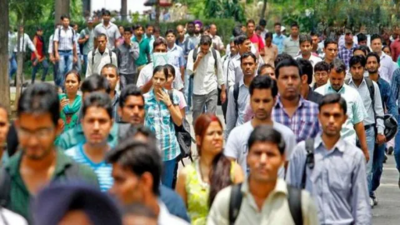“Have you noticed that PhD scholar selling fruits?” A video highlights the job crisis in Jammu and Kashmir as political parties make a flurry of promises.
Traveling through Srinagar and engaging with students or young job seekers reveals a troubling narrative. Every other person seems to share the same tale: that of a young PhD scholar selling dry fruits by the

Traveling through Srinagar and engaging with students or young job seekers reveals a troubling narrative. Every other person seems to share the same tale: that of a young PhD scholar selling dry fruits by the roadside. Many have seen the viral video on WhatsApp or social media, and it resonates deeply.
Discussions inevitably touch on the topic of reservations, especially in Jammu, which often differs from the Kashmir Valley in various respects.
From Jammu University to colleges and coaching institutes in Srinagar, there’s a palpable sense of frustration over the lack of job opportunities. In Kashmir, this frustration is intensified by anger over the abrogation of Article 370. In Jammu, while there is little mourning for the lost special status, there’s concern that the region might continue to be overlooked due to the intense focus on Kashmir.
The video that keeps surfacing in conversations features Dr. Manzoor Hasan, a self-identified PhD scholar forced to sell dry fruits on the roadside in Shopian, South Kashmir. Accompanying posts often contain brief narratives that amplify the video’s impact.
According to a government response in the Rajya Sabha last year, the unemployment rate among 15 to 29-year-olds in Jammu and Kashmir for the July 2020 to June 2021 period was 18.3%, compared to 12.9% for the rest of the country—this during a time when the pandemic severely affected the economy.
In response to rising unemployment, major political parties are making promises to create more jobs. The Congress has pledged to fill one lakh vacant government positions within 30 days, while the BJP aims to create five lakh jobs through the Pandit Prem Nath Dogra Rozgar Yojana. Even regional parties like the National Conference and the Peoples Democratic Party, while focusing on Article 370 restoration, are promising significant job creation.
Many youths relate the plight of the PhD student in the video to their own struggles, particularly in light of the increasing reservations affecting “open merit” candidates. The Modi government’s expansion of the ST quota to include more tribal groups has stirred controversy. Last year, a separate 10% reservation for Paharis under the ST category and an increase in the OBC quota to 8% were announced.
At Sher-e-Kashmir University of Agricultural Sciences and Technology, student Junaid points out the complexities of the reservation landscape: “There’s 8% for SCs, 10% for Paharis, 8% for OBCs… overall, reservations have risen to about 70%, leaving open merit students with only 30%.”
In Jammu, there’s concern about how the new quotas will affect the region, as many believe that the focus remains disproportionately on Kashmir. One Kashmiri Muslim student in Jammu expresses this sentiment, saying, “Everyone talks only about Kashmir… There is little focus on Jammu.”
Another student adds that even after the abrogation of Article 370, Kashmir continues to benefit disproportionately. “Kashmiris can earn money sitting at home,” they note, highlighting the tourism advantages that Jammu lacks.
While some in Jammu acknowledge development since the removal of special status, they do not want that progress to be reversed. In Kashmir, the abrogation remains a symbol of perceived governmental overreach, with students yearning for freedom and job opportunities.
At coaching centers across Srinagar, the stark reality of highly qualified individuals settling for low-skilled jobs is evident. A student coordinator, who holds a Master’s in Civil Engineering, reflects on the desperation faced by many: “I’ve interviewed postgraduate candidates for roles as floor incharges and helpers… It’s disheartening.”
The issue of rampant drug use among youth in Kashmir is also linked to unemployment. The coordinator explains that many young people turn to drugs due to lack of stable income and widespread depression. “Paper leaks are another concern,” she adds, illustrating the complexities of the situation.




